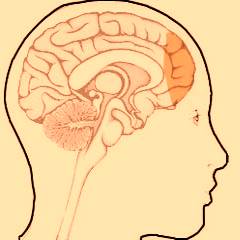Who Is Driving Your Classroom?

I was reading about the pre-frontal cortex. Really. Last part of the brain to evolve, the last part of the brain to develop. And it's pretty fragile. An area that often gets hit, and the first part to go in the aging process.
Researchers like Adele Diamond studying developmental cognitive neuroscience are looking at that part of the brain are finding evidence that when children start school not ready to learn, it's not necessarily because they do not know their letters or numbers, but because they lack the critical ability to regulate their social, emotional, and cognitive behaviors. Even with older students, this self-regulation, also known as executive function, seems to have a stronger connection to academic achievement than IQ or entry-level reading or math skills. And, children learn to regulate their own behaviors at an early age in school as they enact increasingly more complex scenarios in their imaginary play in preschool and in learning activities in kindergarten.
Executive function relates to abilities to differentiate among conflicting thoughts, determine good and bad, better and best, same and different, future consequences of current activities, working toward a defined goal, prediction of outcomes, expectation based on actions, and social "control."
Executive function, cognitive flexibility, and inhibitory control are all concepts that certainly are involved in teaching at all levels. But when you are more concerned with teaching content and teaching skills, those might not be ideas that you are familiar with or that influence your approach to teaching.
 This research also also leads us to consider whether or not you always need the content to learn a related skill. How much content about a car do I need to know to be able to drive it? How much do I need to know about Moby Dick to write about it? Do I need to read the entire book, learn about Herman Melville, read his other books, read related books?
This research also also leads us to consider whether or not you always need the content to learn a related skill. How much content about a car do I need to know to be able to drive it? How much do I need to know about Moby Dick to write about it? Do I need to read the entire book, learn about Herman Melville, read his other books, read related books?I am not alone in believing that we learn by doing. It's not the only way we learn, but I think we learn best that way. Who learns more about driving a car - the driver or a passenger? Who learns more about the driving route - the driver or a passenger?
Who is driving your classroom? Are your students driving, or are they passengers along for the ride?
Secondary and higher education teachers are lovers of content. They might tune out when they hear educational theory - especially research on childhood pedagogy. That's a shame, because there is so much good information and so many classroom ideas to be found there. Maybe your library has a copy of Tools of the Mind (The Vygotskian Approach)
Comments
No comments